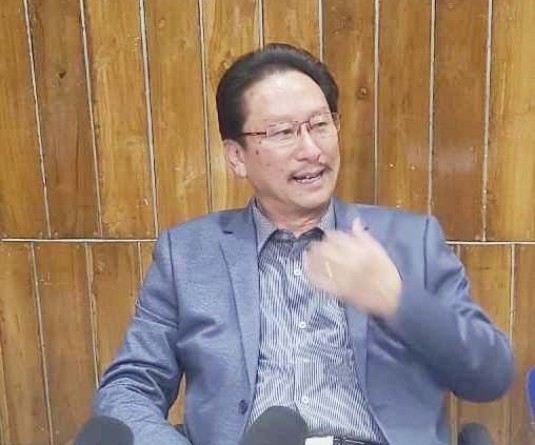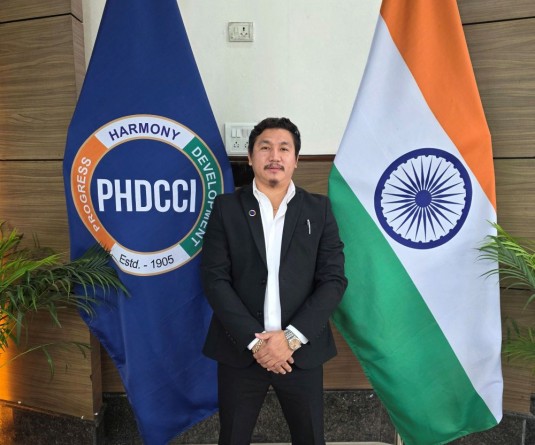
Our Correspondent
Kohima | June 30
Science College Sub Centre, Jotsoma under Kohima district has been upgraded to a Health & Wellness Centre (HWC) today under Ayushman Bharat for provision of comprehensive primary health care services to the catchment population.
It was dedicated in the presence of officials from United States Agency International Development (USAID), Johns Hopkins Program for International Education in Gynecology and Obstetrics (Jhpiego) India and officials from health & family welfare, Nagaland. Science College Sub Centre, Jotsoma was set up in 1962 for provision of Antenatal Care (ANC) and immunization services.
To promote healthy lifestyle, wellness activities such as morning meditation and counselling sessions have been initiated in this HWC.
HWC Science College caters to a population of 2234 and extended services like general OPD, free diagnostics and screening, maternal and child health, management of NCDs, free medicines, pregnancy care, family planning, emergency care, wellness and health promotion, adolescent health, basic eye, ear, nose, throat services and Geriatric care.
‘Decentralization of health care is so important’
Inaugurating the Centre, USAID director (Health office) Xerses Sidhwa appreciated Prime Minister Narendra Modi’s vision on health care around Ayushman Bharat.
He said that decentralization of health care is so important for health, wellness and happiness.
Sidhwa declared that USAID partnership is here to support and help the gaps on health care. Dr. Bulbul Sood, country director Jhpiego India said, "today we are looking at the stage in the health care system in India where we are thinking beyond just diseases."
“We are moving towards wellness,” she said, adding that Jhpiego is looking at prevention of diseases and wellness.
She also urged upon the churches in Nagaland to spread the message of health care on every Sunday service.
HWCs lay significant importance on universal health coverage
I Himato Zhimomi, principal secretary for health & family welfare said that there is a paradigm shift in looking at health throughout the world and India is no different.
He said that Ayushman Bharat, the flagship health programme, rests on the pillar of HWCs for provision of comprehensive primary health care and lays significant importance on universal health coverage.
The HWCs are expected to minimize out of pocket expenditure on health on account of primary health care, which at present is around 70% of the total expenditure.
Zhimomi said that USAID and Jhpiego has been identified as a technical partner to the state and has been providing intensive support to the state’s department of health and family welfare.
The HWCs are envisaged to deliver an expanded 12 range of primary health care services which address the basic primary health care needs of the entire population in their areas, thus expanding access, universality and equity in service delivery. These HWCs will bring quality health care closer to the homes of the community, Zhimomi said.
The principal secretary informed that the state have been able to operationalize 49 SCs, 1 PHC and 2 UPHCs in financial year 2018-19 and also expect the same pace in this financial year also.
Zhimomi thanked USAID and Jhpiego technical teams for the continuous support state in the past one year and look forward to their continued technical support in future.
Background of Ayushman Bharat initiative
Under Ayushman Bharat initiative, Government of India is upgrading Sub Centres (SCs) and existing Primary Health Centres (PHCs) and urban PHCs to Health and Wellness Centres by 2022 to provide Comprehensive Primary Health Care (CPHC).
This will be done through incremental addition of a Community Health Officer (CHO) trained in certificate course in community health.
USAIDS’s flagship Maternal and Child Survival Programme (MCSP) with support from Jhpiego is providing technical assistance for strengthening delivery of comprehensive primary health care services and creation of sustainable training ecosystem in 12 states- Assam, Chhattisgarh, Jharkhand, Madhya Pradesh, Odisha, Arunachal Pradesh, Manipur, Meghalaya, Mizoram, Nagaland, Sikkim and Tripura.
MCSP in Nagaland
MCSP is providing technical assistance at the state level and in seven districts- Mon, Tuensang, Kiphire, Longleng, Kohima, Mokokchung and Dimapur, which includes one aspirational district of Indian government.
The state has targeted to upgrade 56 SCs, 2 PHCs and 3 UPHCs into HWCs in financial year 2018-19.
Till date, 52 HWCs (49 SCs, I PHCs and 2 UPHCs) out of 61 health facilities are functional in the state of Nagaland.
The state has also established 2 training centers (Programme Study centres) for production of CHOs through six month certificate programme in community health.
In 2019-20, the state is planning to upgrade additional 146 CSs, 96 PHCs and 2 UPHCs to HWCs.






